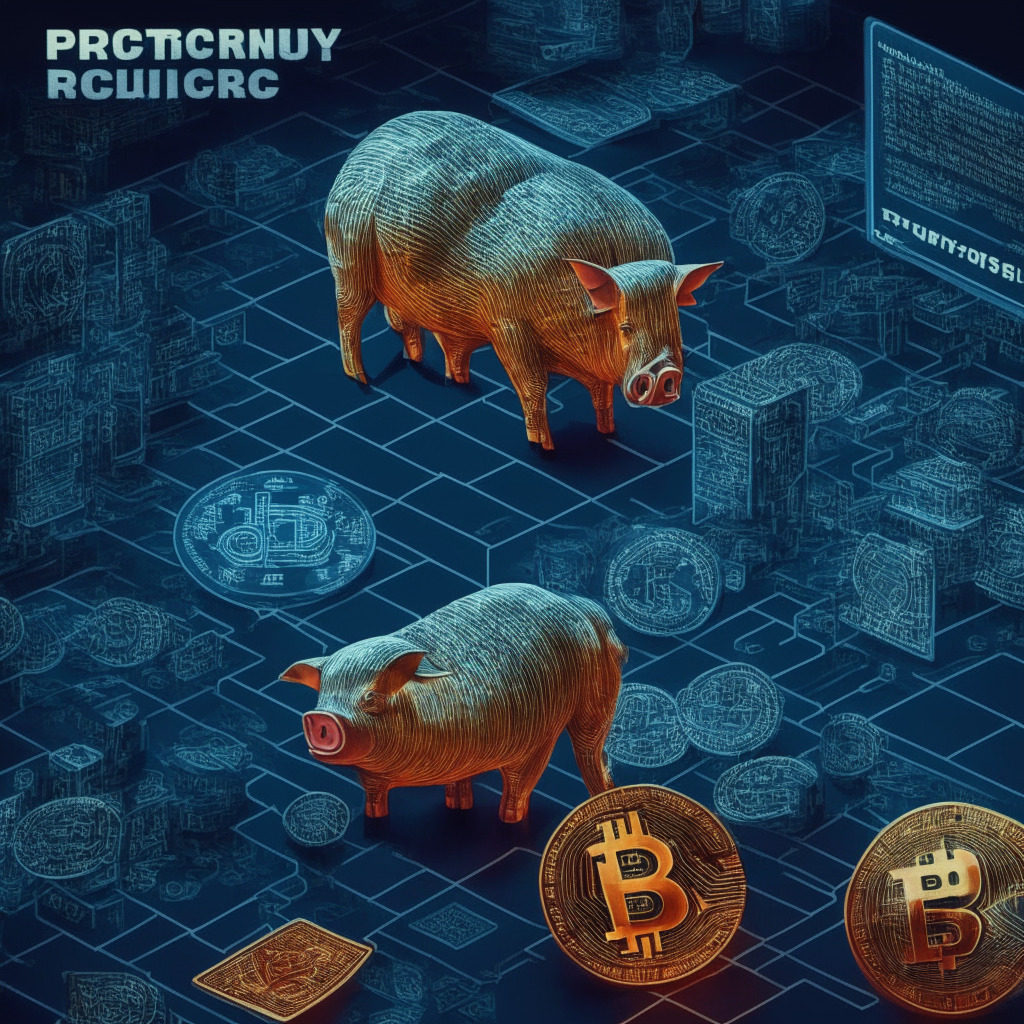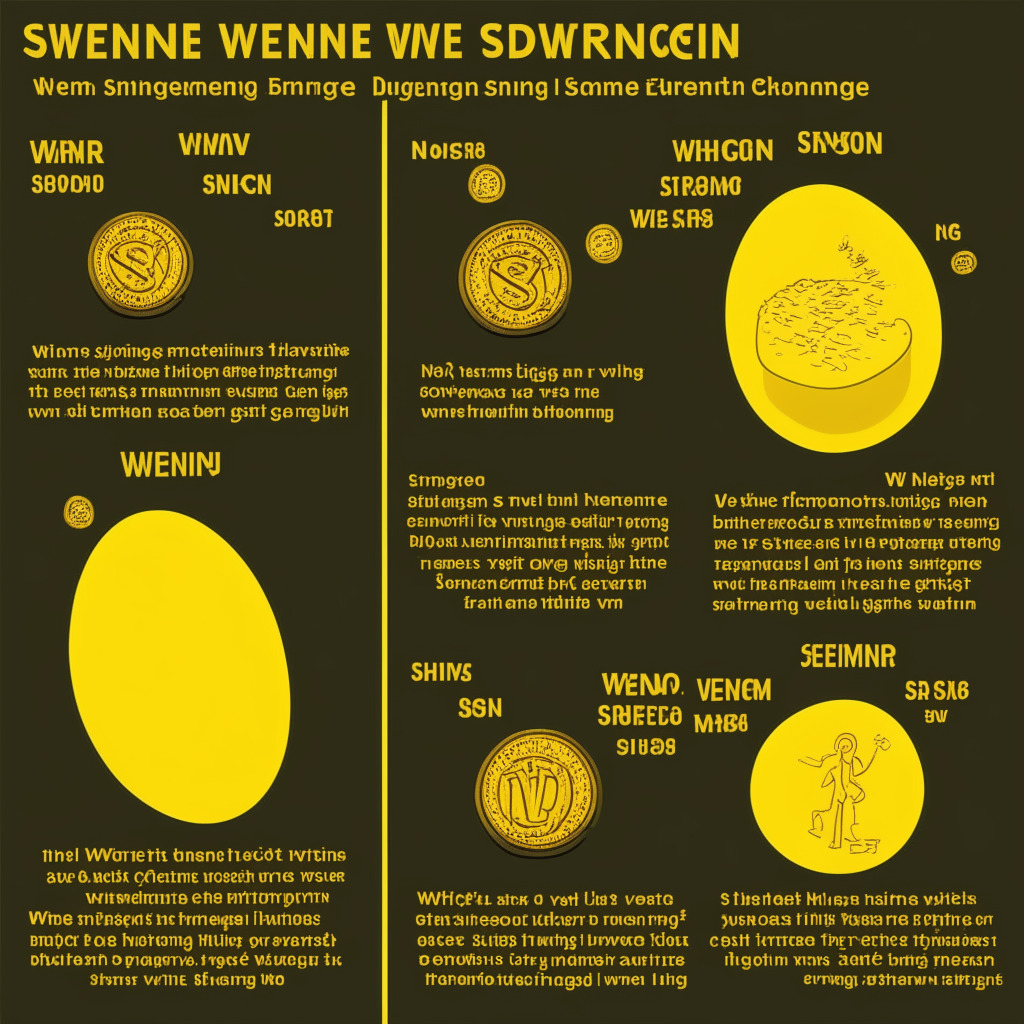Despite the recent downturn in Bitcoin Ordinals, investments in Bitcoin-only companies continue to grow, driven by business and institutional adoption. River, a US-based Bitcoin technology and financial services company, recently secured $35 million in Series B funding, highlighting interest in Lightning Network solutions for low-fee, high-throughput payments.
Search Results for: Wall
Bitcoin’s Unexpected BRC-20 and NFT Boom: Threat to User Inclusion or Permissionless Progress?
The launch of BRC-20 tokens and Ordinals NFTs on Bitcoin has transformed the blockchain, drawing comparisons to Ethereum and raising concerns over memecoins, congested block space, and soaring transaction fees. Opinions vary on whether to enforce strict Taproot validation or consider forking Bitcoin, while the community focuses on making tokens more efficient and exploring data storage on Bitcoin’s blockchain.
Anchorage Digital Enhances Crypto Governance with Snapshot Voting: Pros, Cons & Conflicts
Anchorage Digital integrates Snapshot voting for custody customers, aiming to improve participation in crypto governance. Supporting over 60 ERC-20 tokens, the off-chain platform eliminates interoperability issues and streamlines protocol interactions. Snapshot’s gasless voting feature enhances accessibility, reflecting the growing importance of efficient crypto governance mechanisms.
AiDoge: Revolutionizing Meme Culture with AI Technology and Crypto Market Integration
AiDoge combines artificial intelligence and meme culture, using image-generative AI to create memes in response to text prompts. The platform employs machine learning and neural networks, revolutionizing interaction with software and offering a promising growth potential in the crypto world.
EU’s MiCA Legislation: A Step Towards Unified Crypto Regulations and Market Transparency
The European Union’s MiCA legislation has received final approval, introducing a harmonized regulatory framework for cryptocurrency businesses. Aimed at preventing money laundering and requiring authorization from the EU, the law brings greater transparency and compliance, covering issuers of various tokens and service providers like trading venues and crypto wallets.
Ethereum Price Dips and Lido Withdrawals: Analyzing the Impact on Blockchain’s Future
Ethereum price dips 0.5% in 24 hours as Lido rolls out withdrawals on its ETH staking platform. Despite the decline, technical indicators suggest a breakout rally. Increased adoption and ETH staking withdrawal availability could drive prices upwards.
SEC vs. Coinbase: The Battle for Clearer Crypto Regulation and Its Impact on the Industry
The SEC urges a judge not to entertain Coinbase’s request for clearer crypto regulation guidelines, stating it’s not mandated to fulfill Coinbase’s outlined requirements. Coinbase claims the SEC refuses to address its rulemaking petition while aiming to initiate enforcement actions for listing unregistered securities. The SEC argues regulatory changes necessitate time and deliberation with no completion deadline.
EU’s Crypto Regulation Leap: Balancing Innovation and Oversight in the MiCA Era
The European Union (EU) finance ministers unanimously approved the Markets in Crypto Assets regulation (MiCA), positioning the EU at the forefront of crypto licensing regimes. Along with MiCA, new anti-money laundering measures related to crypto fund transfers were endorsed. These regulations bring legitimacy and oversight to the crypto industry while potentially impacting innovation and privacy concerns.
SEC Crackdown on Coinbase: Assessing Revenue Impact and Regulatory Challenges in Crypto
The upcoming SEC enforcement action against Coinbase may impact the company’s revenue streams and challenge its attempts to pivot away from the US market, raising questions about cryptocurrency exchanges’ sustainability amidst changing regulatory landscapes.
BlockFi Bankruptcy: Creditors Blame Management, Not FTX, for Company’s Downfall
The BlockFi Creditors Committee disputes BlockFi’s claim of being a victim of FTX and Alameda, blaming poor management decisions for the company’s downfall. They highlight a series of financial losses, potential tax complications for customers, and mishandling of customer funds. Despite recent rulings, BlockFi’s future depends on claims against Alameda and FTX.
Celsius Withdraws $781M in stETH from Lido: Strategic Move or Risky Gamble?
Celsius is transferring 428,015 stETH ($781 million) from liquid staking platform Lido, possibly in preparation for withdrawal. This move could enable Celsius to stake directly without Lido’s intermediary role, increasing profits but also exposing them to potential security risks and impacting Lido’s staking dominance.
G7 Summit Sparks Crypto Regulation Debate amid North Korea Hacking Concerns
The G7 central bank governors and finance ministers’ summit has highlighted the urgent need for regulatory measures to prevent North Korea’s hacking activities involving cryptocurrencies. Japan calls for other nations to follow its lead in blocking North Korea’s raids, emphasizing the importance of a robust regulatory framework to address growing concerns surrounding crypto theft and misuse as global crypto adoption increases.
SEC Denies Coinbase’s Call for Crypto Clarity: Debating Industry Demands vs Regulatory Caution
The SEC has rejected Coinbase’s request for regulatory clarity in the crypto industry, stating that no statute requires them to act within a specific timeline. This highlights the ongoing struggle between the crypto industry’s demands for clarity and the cautious stance taken by financial authorities like the SEC.
Crypto Scams at an All-Time High: Pig Butchering, Blockchain Investigations, and Prevention
The USSS and REACT recently hosted an AMA discussing the rise of cryptocurrency scams, with “pig butchering” identified as the most encountered type. Despite challenges in crypto investigations, the blockchain’s transparency offers unique advantages for tracking the flow of money. As the crypto landscape expands, education and collaboration become vital for fighting criminal activities exploiting the technology.
Crypto Paychecks: A Growing Trend Among Millennials and Gen Z Workers
Millennials and Gen Z workers show increasing interest in receiving salaries in digital assets. Ohio-based startup Rise offers a unique service, allowing companies and employees to choose between fiat and cryptocurrency payments. Leveraging smart contracts, Rise provides instant payments and flexibility for users, while also exploring opportunities in decentralized finance.
Unmasking Greed: A Cryptocurrency Social Experiment Reveals Trader Vulnerabilities
The GREED experiment, created by Ivor Ivosevic (Voshy), unveiled the risky psyche within the cryptocurrency trading community, teaching a lesson in internet security, morality, and sensibility. Despite warnings about the token, the hype persisted, revealing the power of social media against vulnerable users and the impact of greed on human behavior.
Crypto ETPs Attracting Professional Investors: Potential and Concerns Behind Emerging Trend
A recent study reveals that 75% of professional investors don’t have exposure to cryptocurrencies, and about half are considering entering the market via exchange-traded products (ETPs). However, direct investment in cryptocurrencies is less appealing, with only 37% showing interest. As the crypto market evolves, it attracts more attention, highlighting the potential of the market and need for secure investment structures.
LG’s Blockchain Smart TVs: NFT Trading Revolution and Tech Giants’ Race to Dominate Web 3.0 Market
LG Electronics filed a patent for a blockchain-based smart TV, aiming to facilitate seamless NFT trading directly from the device. Users will connect their crypto wallets and an NFT market server, with transactions guided by onscreen QR codes. This innovation reflects the growing trend of tech companies, like LG and Samsung, exploring Web 3, Crypto, Blockchain, and Metaverse technologies to shape the future of technology.
WEN Token’s Dismal Decline vs $SPONGE’s Steady Resilience: Where to Invest Next?
While WEN token faces a drastic decline, $SPONGE offers a promising alternative for crypto enthusiasts, showcasing an astounding +605.79% growth from its all-time low. High trading volumes, locked liquidity, and a growing community contribute to its credibility and potential investment opportunity in the meme coin market.
G-7 Finance Ministers Embrace Crypto Regulation and Central Bank Digital Currencies
The G-7 finance ministers discussed their commitment to regulating crypto-assets and exploring central bank digital currencies (CBDCs) in a recent meeting. They emphasized the need for effective regulatory frameworks while supporting innovation and addressing potential risks to the monetary and financial system.
Litecoin’s Surge: LTC-20 Token Standard, NFTs & Future Price Predictions Debated
Litecoin (LTC) experienced a significant price increase recently, with a 6.5% rally on May 15, outperforming Bitcoin and Ether. This boost has been partly attributed to the new LTC-20 token standard, enabling NFT minting on the Litecoin blockchain and increasing network activity.
BlockFi Bankruptcy Saga: Impact on Crypto Recoveries and Balancing Innovation with Regulation
BlockFi clients’ fund recoveries, potentially over $1 billion, hang in the balance as claims against commercial counterparties, including FTX and Alameda, dominate recent court filings. The extent of recoveries hinges on ongoing litigation, underlining the importance of ensuring the safety, security, and balancing innovation with regulation in the rapidly evolving crypto market.
South Korean Crypto Scandal: Insider Trading or Preferential Treatment?
South Korean lawmaker Kim Nam-kuk’s crypto investments scandal, involving $4.5 million worth of wemix coins, has led to his resignation and raids on exchanges Upbit and Bithumb. It raises questions surrounding potential insider information, preferential treatment, and the need for increased transparency and fairness in the crypto market.
Samsung and Bank of Korea: Pioneering Offline CBDC Technology and its Implications
Samsung Electronics partners with the Bank of Korea to conduct research and develop an ecosystem for a Central Bank Digital Currency (CBDC). They aim to collaborate in the offline payment sector and expand the global growth of offline CBDC technology, enabling secure and device-to-device transactions through near-field communication.
South Korean Crypto Scandal: Striking a Balance between Regulation and Innovation
South Korean authorities investigate major crypto exchanges Upbit and Bithumb in connection with allegations against former lawmaker Kim Nam-kuk, emphasizing the need for clear regulatory guidelines to ensure transparency, ethical standards, and the protection of stakeholder interests in the industry.
Celsius Network Stakes $75M in ETH: Bold Move or Risky Gamble for Users’ Assets?
Cryptocurrency lender Celsius Network staked $75 million of ether (ETH) through institutional-grade staking service Figment, raising questions about potential risks tied to the uncertain future of Ethereum 2.0 and staking profitability. Critics argue that this exposes users’ assets to vulnerabilities in both the Ethereum network and Figment’s services, while supporters highlight Celsius’ reputable track record and potential benefits of higher yields.
Bitcoin’s Resilience Amidst Dollar Surge: Key Support Holds and Future Implications
As the U.S. dollar surged, Bitcoin experienced a 5.8% drop but managed to hold its key support. With the long-term bullish trend sustained, analysts believe any pullback in Bitcoin would be short-lived, providing prime entry points for investors and signaling long-term confidence in the cryptocurrency.
AI-Generated Content Scandals: Trustworthiness of News in the Digital Age
The Irish Times faced scrutiny after publishing an AI-generated article, raising concerns about digital news reliability and the need for stronger controls. The incident highlights challenges news organizations face in maintaining authenticity amidst increasing AI-generated content prevalence.
Bitcoin’s $27,200 Milestone: Hopeful Optimism or Cause for Caution?
Bitcoin’s price surpasses $27,200, generating optimism and caution among investors. Michael Saylor asserts Bitcoin’s moral imperative, offering global hope and property rights through mobile devices. However, decreased long-term holder market activity raises questions on Bitcoin’s sustained growth and challenges in the evolving financial landscape.
North Korean Crypto Heists: Protecting Japan’s Booming Blockchain Economy
North Korean hackers have allegedly stolen $721 million in cryptocurrency from Japan since 2017, contributing to 30% of global crypto thefts. Japan’s favorable regulatory environment and increased cryptocurrency adoption create an attractive target, requiring a balance between innovation and stringent security measures to protect investors.
Crypto CEO Arrest Controversy: Regulation Challenges and the Fight Against Illicit Activities
Terraform Labs’ CEO Do Kwon’s recent arrest raises questions about prosecuting crypto criminals effectively, as authorities struggle to freeze his anonymous wallets. The case highlights a growing global concern about cryptocurrencies’ potential use for illicit activities and emphasizes the need for clear regulatory frameworks.
Worldcoin’s Billion-Dollar Valuation: Crypto Utopia, Privacy Risk, or Both?
Worldcoin, the crypto project led by OpenAI CEO Sam Altman, aims to raise $100 million in a new financing round, attracting investors with its vision of a universal digital currency distributed fairly using biometric iris scans. Despite controversy and concerns, Worldcoin continues gaining momentum in the crypto community.































